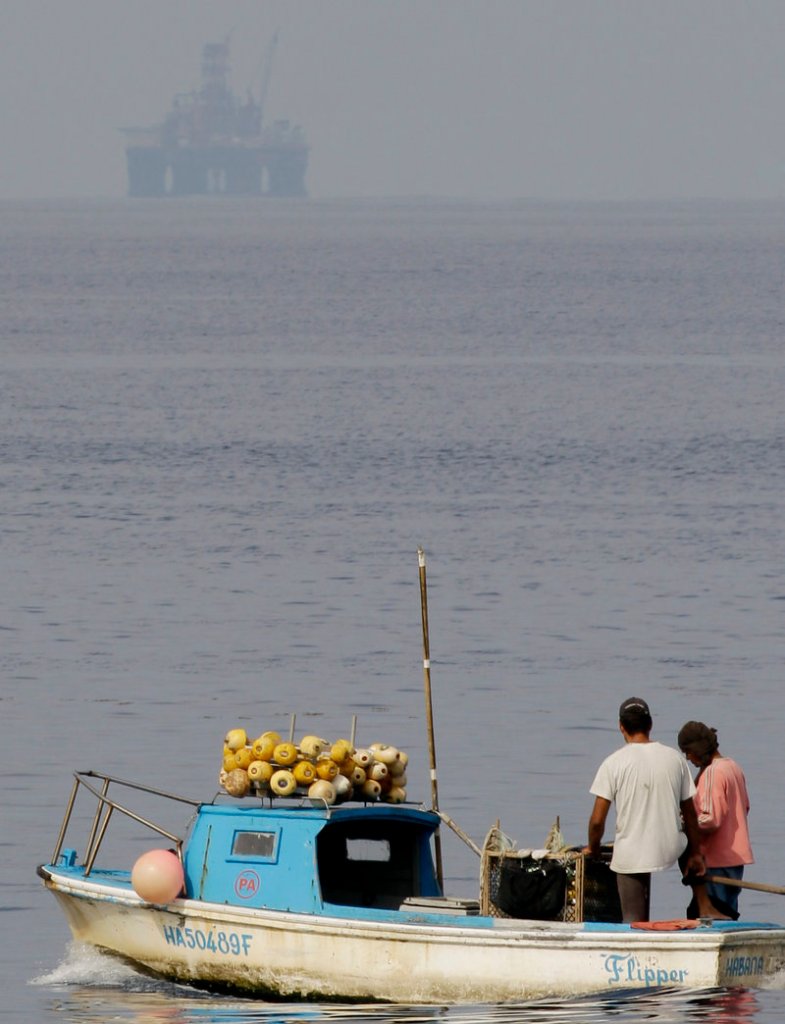MIAMI – The Scarabeo 9 is a state-of the-art oil rig leased by a Spanish company, built in China and Singapore, owned by an Italian company and flagged in the Bahamas. But there’s one part of its international pedigree that has some Floridians up in arms: it will be exploring for oil in Cuban waters.
After traveling halfway around the world, the rig has moved into place some 22 miles north of Havana and about 70 miles south of the Florida Keys. Repsol, the Spanish company that is leasing the rig for $511,000 day, said drilling began last week.
But already, without finding a drop of oil, the hulking Scarabeo 9 has become one of the most analyzed, discussed and vilified rigs to ever sink an exploratory well.
Not only has its location raised fears that a blowout could dump oil on Florida’s beaches and damage sensitive mangroves, sea grass, coral reefs and marine life, but the U.S. embargo against Cuba also has made preparedness and recovery from a possible oil spill particularly tricky.
While efforts by Cuban-American members of Congress to prevent Repsol from drilling altogether have been unsuccessful, there are still several bills pending that could complicate the company’s efforts.
“The political pressure on (Repsol) is unbelievable,” said Jorge Pinon, a former Amoco executive and now an oil consultant and visiting research fellow at Florida International University.
But with the rig now in place, the question has become how prepared are the United States, Cuba and Repsol to respond if disaster strikes?
Much of any U.S. response effort would be centered in South Florida.
The Miami-based 7th Coast Guard District would be responsible for coordinating efforts to protect U.S. waters and shoreline, and the first private response to a major spill would likely come from Clean Caribbean & Americas, a Broward County oil spill response cooperative whose members include most of the major oil companies in the region.
The cooperative and Oil Spill Response, its sister organization in the United Kingdom, did much of the work on Repsol’s Cuban contingency response plan. “I think it’s in line with what they have elsewhere in the world,” said Paul Schuler, the cooperative’s president.
Although the United States has no regulatory control over Repsol’s drilling in Cuba, the Spanish company has voluntarily provided information on its drilling plans and allowed U.S. agencies to board and review the rig’s construction and safety systems when it was off the coast of Trinidad & Tobago earlier this month.
The Coast Guard and Interior’s Bureau of Safety and Environmental Enforcement said they found the rig “to generally comply with existing international and U.S. standards.”
Clean Caribbean & Americas’ warehouse is loaded with containment booms, skimming devices, an aerial system designed to spray dispersants from a C-130 Hercules aircraft and other cleanup supplies to respond to a spill anywhere in the region.
Unlike many U.S. companies that are barred by the embargo from doing business with Cuba, the cooperative already has a license from the U.S. Office of Foreign Assets Control that would allow it to respond to a Cuban oil spill. It got the license in 2003 when Repsol drilled its first exploratory well in Cuba, said Schuler.
Repsol found oil but said at the time it wasn’t commercially viable.
Send questions/comments to the editors.



Success. Please wait for the page to reload. If the page does not reload within 5 seconds, please refresh the page.
Enter your email and password to access comments.
Hi, to comment on stories you must . This profile is in addition to your subscription and website login.
Already have a commenting profile? .
Invalid username/password.
Please check your email to confirm and complete your registration.
Only subscribers are eligible to post comments. Please subscribe or login first for digital access. Here’s why.
Use the form below to reset your password. When you've submitted your account email, we will send an email with a reset code.